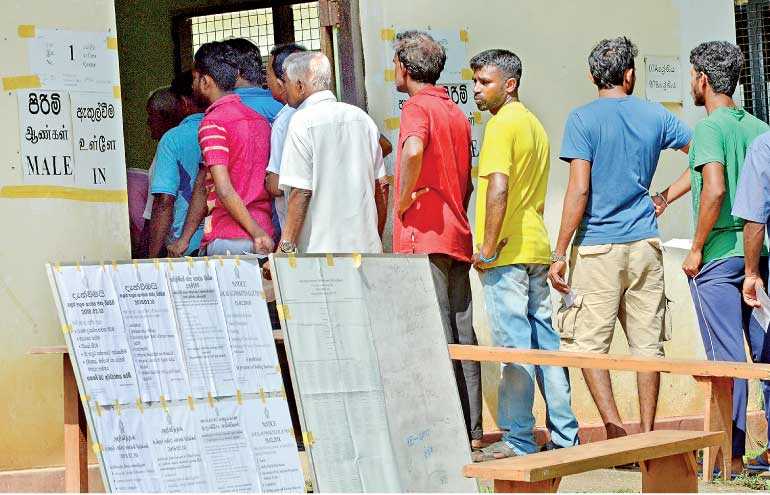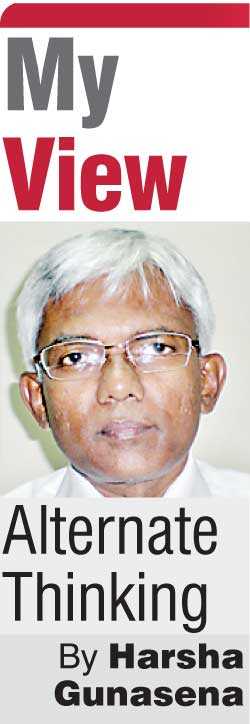Friday Feb 13, 2026
Friday Feb 13, 2026
Wednesday, 18 April 2018 00:05 - - {{hitsCtrl.values.hits}}

People throughout the world, educated or uneducated, tend to vote for short-term gains at the expense of long-term stability which they feel is beyond their reach. Here, voters queue up at a polling station during the Local Government election – Pic by Shehan Gunasekara
Ranil Wickremesinghe was criticised heavily directly and indirectly of his actions in the political and economic fronts by the supporters of the No-Confidence Motion as well as by those who opposed the same.
Wickremesinghe is having his own weaknesses as a politician of the way he operates and the way he deals with the people. His policies may be modified in the coming 18 months with the view of securing victory at the next election. In this light we should examine the policies adopted by Wickremesinghe vis-à-vis the status quo of the country and the reforms needed.
The country is in debt due to the continuous deficit budgets presented by the successive governments, aggravated by the costly loans granted by China for the construction of uneconomical entities. The previous regime was pushed to China by the West and India as a result of the foreign policy it adopted.
Government revenue has suffered due to various tax concessions granted. As a result the portion of indirect taxes increased drastically vis-à-vis direct taxes. Those who enjoyed the tax concessions in the private sector did not contribute adequately to the development of the country although they praised the successive budgets thinking of their personal gains. Eventually poor people paid more taxes than the rich.
Performance of exports dropped drastically and the governments were focusing more on import substitutions. Successive governments contributed to enlarge the public sector just to give employment opportunities to their supporters and to the unemployed youth. Underperforming public sector institutions were maintained for political popularity.
The Unity Government was formed in order to achieve national reconciliation; to adopt a new constitution; and to have long-lasting stable policies of the Government. Although the Government has moved towards that direction, none of these objectives were achieved. However the pledge to re-establish democratic traditions was fulfilled.
This objective was achieved while the people who were used to autocratic rule felt that there was disorder in governance. The public sector of the country which violated the norms blatantly in connivance with the politicians has become inactive in protest or in fear against the investigations mooted. Much-expected Foreign Direct Investments did not turn up due to policy uncertainties of the Government.
Therefore the country needs to take urgent corrective action in order to overcome this situation.
Social issues
Firstly the country needs to address the issues faced by the minorities and certain sections of society. We should address the causes of the three armed struggles launched against the democratically-elected governments of Sri Lanka. The present Government could have done much more for the northern and eastern Tamils in terms of releasing lands occupied by the military and pardoning the arrested persons who were kept in the prisons for a long time with trials.
It appears to be that the Government and its leaders are afraid of the so-called extremist Sinhala Buddhist forces backed by the Buddhist Bhikkhus who do not follow Buddhism. Leaders should realise that although their voices are louder their strength is much lesser. People in this country by large would understand justice once explained to them. Also we need to have balanced military leaders like Denzil Kobbekaduwa who openly said militants could be defeated but the country needed a political solution for the ethnic issue.
An interesting phenomenon of the constitution making process was that the Chief Ministers of the south of SLFP demanded more powers for the Provincial Councils. If the leaders of the governments had taken the lead in the appropriate time we would have made it. When the President said that he did not want to contest for the second time, it would have been ideal if he could have taken the process forward which act would have placed him at a permanent respected position of the history of the country.
The economy
Secondly, we should decide how to handle the economy. Wickremesinghe is identified as a leader with the ideology of neoliberalism which emerged in early 20th century. Neoliberalist ideas include economic liberalisation policies of privatisation, austerity and deregulation. The meaning of neoliberalism changed over a period and at present the term gives a negative connotation which was created by the critics of market reforms.
Revenue of the Government should be increased and the newly-passed Inland Revenue act would support this  endeavour. It would enhance the proportion of direct taxes against indirect taxes. Loss-making Government institutions should be placed under an authority in order to eliminate political interferences and place them in the profit making path if privatisation is condemned neoliberalism. The country cannot stay without doing any of the above. The two biggest banks in the country, Bank of Ceylon and People’s Bank, need reforms although they make profits since the banks in the private sector take cover of these giants and make a killing in the market.
endeavour. It would enhance the proportion of direct taxes against indirect taxes. Loss-making Government institutions should be placed under an authority in order to eliminate political interferences and place them in the profit making path if privatisation is condemned neoliberalism. The country cannot stay without doing any of the above. The two biggest banks in the country, Bank of Ceylon and People’s Bank, need reforms although they make profits since the banks in the private sector take cover of these giants and make a killing in the market.
If the existing private sector cannot improve the exports of the country we should get the foreign investors. Government policies should be stable and in order to support this process we should enter into Free Trade Agreements with strategic partners. At the time the open economy was launched certain industries were wiped out but there was an overall benefit to the country. It is true that it could have been done more cautiously. Now we can have a more cautious approach in entering into FTAs but there should not be undue protectionism and fear. We are a small country with a small market and hence our businessmen should be offensive rather than adapting a defensive strategy and target the world market.
Budget deficits should be minimised if not eliminated and we should cut our coat according to our cloth. If these are neoliberalist solutions what else we can do?
Foreign policy
Thirdly we should redefine the foreign policy of the country. During the past regime the country was aligned towards China. Export markets of Sri Lanka are in the European Union and USA not in China or India. This factor should be considered in designing the foreign policy of the country. Present regime has taken the foreign policy to a neutral stand. Non-alignment is the way out. The proposal of Sirima Bandaranaike to make the Indian Ocean a peace zone should be reactivated. That may be an effective way to balance the emerging super powers China and India.
Democratic traditions
Fourthly we should revisit the newly-established democratic traditions. In 1970 the Sirima Bandaranaike Government established political authority in order to rejuvenate the public sector. We had drastic results. The country has turned 360 degrees and now the authority of the administrative service is re-established. There should be an accountability mechanism for the independent commissions. In order to check the affairs of the Government establishments, people should use the Right to Information Act effectively.
We did not fight for the democracy and it was thrust upon us. Therefore, when democratic forces are in operation people feel that there is no authority. When the Government is criticised heavily and if it is not countered people may feel that the country is moving towards anarchy. If people are asking for a dictatorship they should be able to face the consequences. The country had a narrow escape at the last presidential election.
Public sector
Fifthly, the quantity of the public sector should be reduced, and the quality should be improved. To do that a decent salary should be paid to them. Over the years real income of the public-sector employees has gone down. Government encourages them to have additional incomes. Medical officers are not paid a decent salary and to compensate that they are allowed to do private practice.
By providing the Government employees with a low salary the Government encourages them to accept bribes. When some wants to cut a jak tree, palms of the lower level of government officers should be greased. Therefore people are not growing the trees where they have to get approval to cut. Police officers have to depend on the businessmen of the area to maintain their social status. In the schools, teachers do not teach and they expect students to go for private tuition.
These are far-reaching reforms and most of them would not be popular. One who engages in reforms runs the risk of getting not elected at the next election. People throughout the world, educated or uneducated, tend to vote for short-term gains at the expense of long-term stability which they feel is beyond their reach.
That is the dilemma faced by the democracies, carrying out populist actions rather than enforcing reforms much needed. There is no point of blaming the politicians for this. The general public should take the blame themselves if they behave like that.